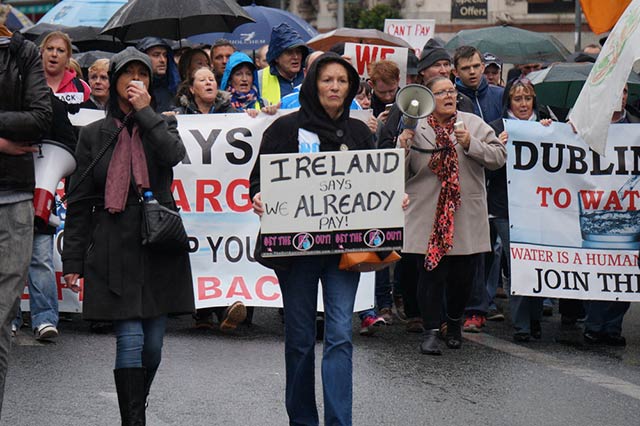
Honest, paywall-free news is rare. Please support our boldly independent journalism with a donation of any size.
Syriza has taken power in Greece and Podemos is rising in Spain. And now, people in the Republic of Ireland are fighting back as well, notwithstanding the “model pupil” label ascribed to the country by European elites.
The austerity program imposed by the troika of the European Commission, European Central Bank and the International Monetary Fund starting in 2010 stipulated that charges for households’ water consumption should be introduced – a plan that the right-wing government now in power is implementing. Notwithstanding public pronouncements to the contrary, the plan is most likely to eventually privatize Irish Water, the public utility set up to charge citizens for water.
This has provoked a strong popular movement against water charges. Its importance cannot be overstated; it is simply “the largest and broadest, and most sustained, social movement in Ireland since independence in 1921,” as an important new report concludes. Communities have been attempting to block the installation of water meters in neighborhoods throughout the country. Nationally, five demonstrations have gathered between 20,000 and 150,000 people. Relative to population, a protest of 100,000 in Ireland is equivalent to 1 million in Spain. Indeed, we are witnessing the “birth of a new civil society.”
The movement has made important gains already. It has forced the government to reduce the average annual charges from 278 to 160 euros per household. But protesters want to abolish Irish Water entirely and keep water – which after all, is not in short supply on the Emerald Isle – free. Fully one-third of households liable to pay the charge, or about 500,000, have refused to register to pay. Protest groups hope that this boycott will force the government to cancel its plans, being unable to process such a high number of payment refusals.
The opposition movement is important because it started from the bottom-up in communities around the country. In November, more than 100 local protests linked to Right2Water took place, gathering more than 150,000 people.
The protests erupted in such a way because water charges are the proverbial straw that broke the camel’s back in the seemingly never-ending austerity measures that have affected so many aspects of community life. For example:
– According to official statistics, 30.5 percent of the population is now suffering from deprivation – up from 12 percent in 2007.
– Health spending was cut by 27 percent between 2009 and 2014.
– Communities have faced a series of cuts between 2008 and 2014, including cuts to:
– a violence against women program: -38.2 percent
– women’s organizations: -48.7 percent
– projects for youth: -44.1 percent
– community development: -43.6 percent
– voluntary social housing: -50.0 percent
– drug programs: -37.0 percent
– family support agency: -32.5 percent
Another reason why the protests have emerged at the grassroots level: Normal institutional channels on the left to voice discontent and popular aspirations have been closed off in Ireland due to the conservative nature of such groups and their co-optation by the government. For example, the traditional left political parties (Labor and the Greens) have supported water charges, while many key trade unions and civil society organizations and charities have chosen simply not to oppose them.
A few more progressive unions and political parties, together with community groups, have thus joined together to lead the opposition to water charges. The networks formed promise to survive beyond the current struggle and have positive consequences on popular organizing and action for years to come.
A report surveyed 2,500 people involved in the protests and found that 54 percent of respondents had never protested before joining the water charge opposition movement. This indicates that people are becoming politicized and are aware that many others around the country are also opposed to Irish Water.
Also, 92 percent said they wouldn’t pay their water charges and 83 percent mentioned they would vote for broadly left parties in the next election, including the Anti-Austerity Alliance, People Before Profit, independents and Sinn Fein. A clear majority said they had voted for government parties in 2011, but would not repeat that mistake again. Seventy-eight percent said the most effective way of changing things in Ireland is through protesting, against only 28 percent who said it is by contacting a political representative, pointing to the high level of disillusion toward mainstream institutions.
In short, if there is one thing that unites Ireland, it is lack of trust in the political class. The campaign against water charges is now attempting to build on this resentment and channel it effectively to influence policy.
Thank you for reading Truthout. Before you go…
…We ask that you take just a second to read this message.
We are up against a far-reaching, wide-scale attack on press freedom coming from the Trump administration. Since his inauguration last year, we’ve seen frightening censorship, a right-wing takeover of the news industry, and worsening financial conditions for progressive nonprofits across the board.
We can only resist Trump’s agenda by cultivating a strong base of support. The right-wing mediasphere is funded comfortably by billionaire owners and venture capitalist philanthropists. At Truthout, we have you.
We need your help to sustain the fight against authoritarianism in 2026. Please take a meaningful action in this fight: make a one-time or monthly donation to Truthout. If you have the means, please dig deep.